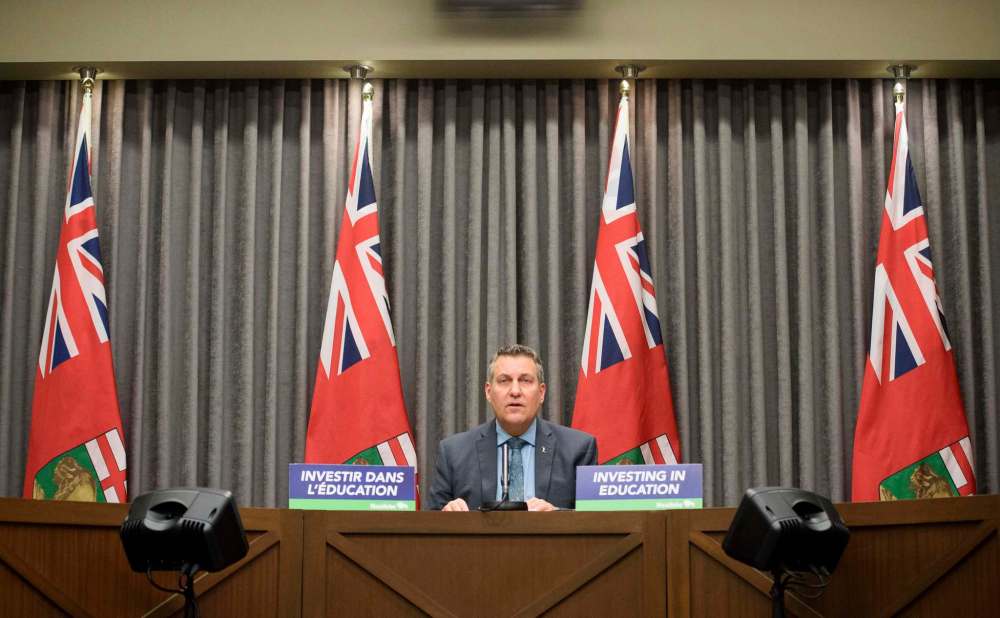Manitoba rolls out 2021-22 education funding blueprint
Advertisement
Read this article for free:
or
Already have an account? Log in here »
To continue reading, please subscribe:
Monthly Digital Subscription
$0 for the first 4 weeks*
- Enjoy unlimited reading on winnipegfreepress.com
- Read the E-Edition, our digital replica newspaper
- Access News Break, our award-winning app
- Play interactive puzzles
*No charge for 4 weeks then price increases to the regular rate of $19.00 plus GST every four weeks. Offer available to new and qualified returning subscribers only. Cancel any time.
Monthly Digital Subscription
$4.75/week*
- Enjoy unlimited reading on winnipegfreepress.com
- Read the E-Edition, our digital replica newspaper
- Access News Break, our award-winning app
- Play interactive puzzles
*Billed as $19 plus GST every four weeks. Cancel any time.
To continue reading, please subscribe:
Add Free Press access to your Brandon Sun subscription for only an additional
$1 for the first 4 weeks*
*Your next subscription payment will increase by $1.00 and you will be charged $16.99 plus GST for four weeks. After four weeks, your payment will increase to $23.99 plus GST every four weeks.
Read unlimited articles for free today:
or
Already have an account? Log in here »
Hey there, time traveller!
This article was published 05/02/2021 (1774 days ago), so information in it may no longer be current.
No Manitoban will see an increase in their property education tax bill next year, as the province implements its first step in phasing out the tax to change how public schools are funded.
Education Minister Cliff Cullen unveiled Friday a breakdown of the province’s $1.35-billion commitment to K-12 school operations for 2021-22.
Manitoba’s 37 school divisions will receive, for another consecutive year, a $6.6-million boost in base funding, or the equivalent of a 0.5 per cent increase.

Cullen also touted an additional $5.5 million in special needs funding for divisions to provide educational assistants, assistive technology, and other resources school teams identify as necessary for students with disabilities.
School divisions have been asked to freeze property education taxes in planning their upcoming budgets, following several years of the province capping increases at two per cent.
“In lieu of that, the province of Manitoba will be picking up the tab,” Cullen said, adding provincial grants that are the equivalent of a two per cent fee hike will be available.
The minister added divisions can expect no less than 98 per cent of the operating funding, which is heavily reliant on enrolment figures, received for the current academic year.
Fort La Bosse will see the largest hike (7.9 per cent) in funding, taking into account both base increases and special needs funding, while Lakeshore will see the largest decline (-1.6 per cent) next year.
Per the province’s promise, enrolment fluctuations, owing to a spike in homeschooling because of COVID-19 concerns, did not affect funding levels.
It is noteworthy the province is providing additional special needs funding for the first time since the Pallister government took office in 2016, said Alan Campbell, president of the Manitoba School Boards Association.
At the same time, he said, the funds won’t go very far across 37 divisions, with the majority scheduled to receive a funding decrease or stable funding — despite a two per cent hike in annual inflation costs.
“The system is holding the line and school boards are doing their level best to allocate funds locally in a way that preserves local programming and local resources,” Campbell said.
Calling the announcement a “de facto” cut, NDP leaders took issue Friday with the fact Cullen did not indicate how students will be supported in a post-COVID-19 pandemic world.
“All I can think of right now is that principal that’s sitting at his or her desk and going, ‘How am I going to meet the needs of my kids coming out of a pandemic, never mind being in the pandemic?’” said Nello Altomare, a former principal, who is the Opposition’s education critic. “This is going to be an absolutely difficult pill to swallow.”
The MLA for Transcona said more resources will be needed to meet demand for mental health services and occupational therapists, among other items.
Recovery learning will also come at a cost, but the province has yet to acknowledge or fund it, said James Bedford, president of the Manitoba Teachers’ Society.
With funding not keeping up with the rate of inflation, Bedford said cuts will have to be made and they will affect student opportunities; he listed student electives, apprenticeship programs, and fewer hires resulting in larger class sizes, as past products of cuts.
Also Friday, Cullen said Manitobans can expect the release of the K-12 education review “in the very near future.”
— with files from Carol Sanders
maggie.macintosh@freepress.mb.ca
Twitter: @macintoshmaggie

Maggie Macintosh reports on education for the Winnipeg Free Press. Funding for the Free Press education reporter comes from the Government of Canada through the Local Journalism Initiative.
Our newsroom depends on a growing audience of readers to power our journalism. If you are not a paid reader, please consider becoming a subscriber.
Our newsroom depends on its audience of readers to power our journalism. Thank you for your support.

